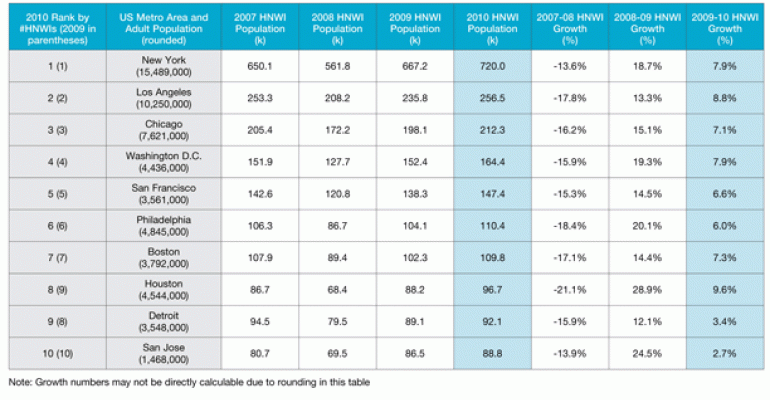After studying Capgemini’s recently-released 2011 U.S. Metro Wealth Index, wealth management firms who aren’t doing business in the New York or Houston markets may be asking themselves why not.
New York’s dominance of the U.S. wealth management market is nothing short of staggering.
According to Capgemini, the New York MSA (metropolitan statistical area) has 720,000 high-net-worth individuals with $1 million or more in investable assets. That’s nearly three times more than Los Angeles, the second largest market, which has 256,500 wealthy individuals. Chicago, Washington, D.C. and San Francisco follow, with 212,300, 164,400 and 147,400 high-net-worth individuals, respectively.

Houston, powered by the city’s high-flying energy industry, emerged as the fastest-growing wealth management market, expanding its million-dollar-plus population nearly 10 percent, from 88,200 in 2009 to 96,700 last year. And that fast pace is likely to continue, industry experts say, pointing to Houston’s thriving medical, high-tech and legal industries that compliment the formidable oil and gas-related businesses.
What’s more, ExxonMobil, one of the largest corporations in the world, announced last month that it is building a massive 385 acre campus in the Houston suburb of The Woodlands, a move guaranteed to bring in hundreds of wealthy individuals to the market and further boost an already high-powered local economy.
High-net-worth population growth also surged by nearly nine percent in Los Angeles and eight percent in New York and Washington, D.C., followed by Boston (7.3 percent); Chicago (7.1 percent); San Francisco (6.6 percent) and Philadelphia (six percent).
Lure of Big Apple
While New York is by far the biggest wealth management market, it is also the most competitive, home not only to high profile industry giants Merrill Lynch, Citigroup, JPMorgan Chase and Goldman Sachs, but dozens – if not hundreds – of other firms.

Undeterred by the brutal competition and high rents, wealth managers keep moving into Manhattan. In the past few years Glenmede, Pitcairn, Evercore Wealth Management, Fieldpoint Private Bank & Trust, Manchester Capital Management and Aspiriant have all opened offices in New York.
“We had clients in New York, and as we grow, we knew we need to be here,” said Murray Stoltz, president of Manchester Capitol, the Vermont-based multi-family office, which opened an office on Park Avenue in March. “We love our Vermont lineage, but New York has the talent pool we’re going to need, and we also think that boutique MFOs like Manchester can do very well in New York. We’re seeing enough wealthy families who are still considering new advisors and are attracted to the kind of attention and focus that a smaller firm can provide. And as a boutique, we don’t need X percentage of market share to be successful. Big firms need a big share of the market. We don’t.”
Tim Kochis, chairman and director of new business lines for California-based Aspiriant, which opened a New York office last year as part of its national push, agreed.
“We don’t need to have a very large share of the market to be successful,” Kochis said. “We’re finding that the concept of an independent, comprehensive wealth management firm is still underutilized in New York, where most wealthy individuals already have a relationship with a broker. So while there’s an educational effort on our part, we think the opportunities in New York are enormous. It’s also a great source of talent, in addition to being very helpful for career development in the firm. A talented wealth manager may want to spend time in New York, and now that’s an available option.”
Houston, U.S. Capital Rise
Houston’s explosive growth is exemplified by the remarkable rise of U.S. Capital Advisors, which opened its doors in September 2010. Ten months later, the firm has over $2 billion in assets under management, and Patrick Mendenhall, the firm’s founder and chief executive, expects that figure to reach $3 billion by the end of the year.
Mendenhall, a 19-year veteran of UBS in Houston, credits Texas’ “favorable tax laws and business environment” and Houston’s dynamic energy industry for the city’s wealth management boom.
Master limited partnerships in energy-related infrastructure such as oil and gas pipelines have “created a lot of wealth,” Mendenhall said. Not coincidentally, U.S. Capital has built up an impressive energy expertise, establishing a research and trading desk devoted to energy infrastructure.
“We’ve made it a point to have a very strong energy focus,” Mendenhall said. “We have an analyst dedicated to MLPs and two dedicated energy traders. We also host corporate events where we introduce the heads of infrastructure companies to asset managers from all over the country.”
Mendenhall has aggressive growth plans and says he is swamped with queries from wirehouse brokers who want to join his company. Not surprisingly, wealth management firms all over town are also beefing up to handle the expected continued demand for their services, said executive recruiter Tim White. “You’re seeing more activity in the market, and more firms who will have a presence in the market,” White said.
But new entrants shouldn’t expect a cakewalk, warned Artie Kieval, regional manager for Morgan Stanley Private Wealth Management.
The four engines of Houston’s “very diverse economy” - energy, medial, high-tech and legal - “are all clicking right now,” Kieval said. In the past year alone, Morgan Stanley has added four teams to cover the Houston market, with more on the way, he said.
But wealth managers considering coming in should understand that the market is “not undiscovered,” Kieval said.
“All the major players are here,” he cautioned. “You’re not going to walk in and become a game changer. It will take time.”



